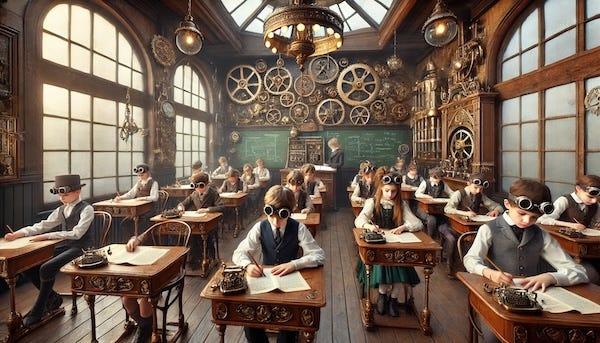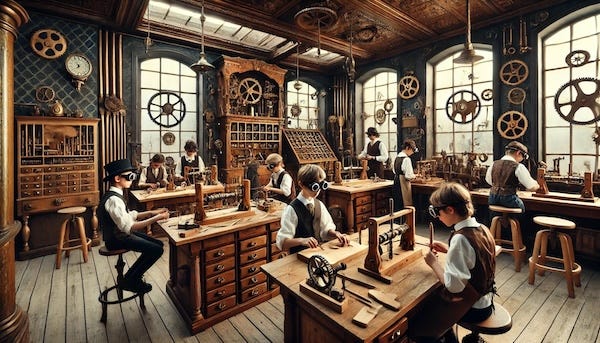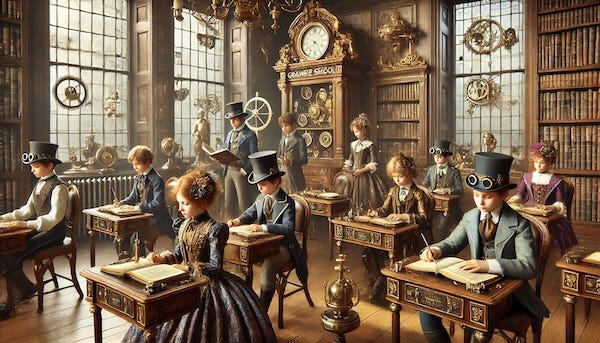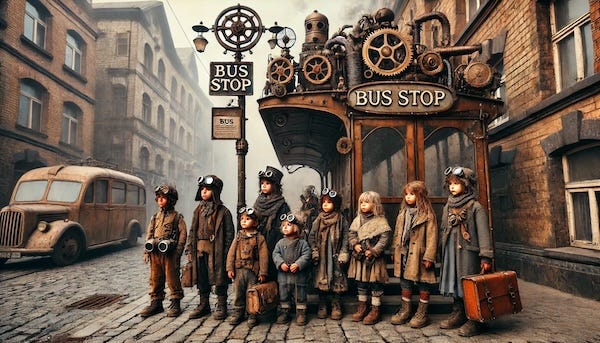11+
Before the Second World War, education in England was not standardised. Poor kids left school before they reached age thirteen and rich kids went to expensive private schools. The Education Act of 1944 introduced the tripartite system with two main goals:
- Everyone should have equal access to the education that best matches their abilities.
- Kids would take an exam at age ten (the 11+ exam) to determine what kind of secondary school would be best for them.
There was to be no concept of “better” or “worse” schools or of “passing” or “failing” the exam. Instead, the exam would match kids’ education to their abilities and interests: grammar schools for academically inclined kids; technical high schools for kids interested in science and technology and secondary-modern schools for everyone else.
The 11+ exam was essentially an IQ test plus an essay, a bit like the SAT that Americans take at 18 to get into a good college and the 11+ had support from across the political spectrum. Labour politicians especially liked the new system because it gave poor kids access to the first-class education that was previously denied to them and Conservatives thought that standards would be improved in state schools if affluent and articulate parents became involved.
The implementation of the tripartite system did not quite live up to the idealism of its designers. Education authorities were keen to have the best grammar schools in the land so they spent a lot of money on those. Grammar schools also attracted the best teachers. Meanwhile, secondary moderns were largely neglected and thought of as low quality while technical high schools were largely forgotten. And, of course, everyone thought of the 11+ as being a pass/fail exam.
It soon became obvious to politicians that passing the 11+ made a huge difference in life outcomes. By the 1960s, it was clear that society was being divided into a well-educated middle-class elite and a barely educated working class. To reverse this division, the Labour Party began to dismantle the tripartite system. They replaced the three types of school with a single “comprehensive” school and eliminated the 11+. Tony Crossland, Labour’s Education Secretary at the time, said “If it’s the last thing I do, I’m going to destroy every fucking grammar school in England.”
In the period when grammar schools were being shut down, the number of kids going to private schools doubled. Presumably, the kids going to private schools were rich kids so if the comprehensive policy was intended to give poor kids equal access to a first-class education, the policy failed.
“If it’s the last thing I do, I’m going to destroy every fucking grammar school in England.”
Note that Tony Crossland went to an expensive private school
By the late 70s, 90% of kids went to comprehensive schools and there was only a tiny handful of counties that stuck with the 11+. Kent, where I went to school, was one of them.
One criticism of grammar schools was that middle-class kids had tutors to help them pass the 11+ while working-class kids were condemned to second-class secondary moderns. Journalist Will Hutton wrote about it in The Guardian.
I went to a grammar school. I am more than familiar with the conceit that we grammar-school products earned our place at university and in later life through merit – and that grammar schools were and are the one honest route to success for able working-class children. It is a conceit based on a myth.
My parents had organised a place at one of the local private schools for if I happened to fail the 11-plus. If two per cent of grammar-school children today qualify for free school meals, it was the same 40 years ago. No one in my class came from the local council estates. We were the children of the professional classes getting a better chance of going to university without paying the fees.
Will Hutton
In the months leading up to the 11+ at my primary school, we practised writing essays and taking IQ tests over and over. Maybe some rich kids had extra tuition but I don’t know what good it would have done since we had more than enough practice in class. Besides, it was obvious long before we even took the test who was going to pass and who wasn’t. I even had a list of the eleven kids (out of sixty) who I thought would pass.
On results day, we each got a big fat envelope to take home to Mum and Dad. I was so sure I had passed that I opened mine right away. My friends weren’t allowed to open theirs but when we got home, the mums all rushed out to greet us and to see the results. Michael passed (he was on my list) but Graham didn’t (he was not on my list). Graham’s mum was devastated and started to cry but since Graham wasn’t on my list, I was surprised that she was so surprised. At school the next day, everyone on my list had passed — plus Jaqueline (sorry I doubted you, Jaqueline!). Of the 12 kids who passed, half were posh kids and half were from the council estate.
Critics of the 11+ (including Will Hutton) often point to the fact that kids who qualified for free school meals seldom passed the 11+. None of the kids in my class who were on free school meals passed — but they weren’t the only ones living in council houses. They weren’t the only poor kids.
Six of us chose Chislehurst and Sidcup Grammar School — the same grammar school as Will Hutton — and on the first day at my new school, a whole squadron of us council estate kids waited for the 229 bus to go up Sidcup Hill. Perhaps Mr Hutton just did not know what council estate kids looked like.
I remember that first day at Chis and Sid when Mrs Stevenson gave us our tour of the school. In the main lobby, the walls were lined with oak panelling and the name of every student who’d ever gone to Oxford or Cambridge was written there in gold lettering. Hundreds of them. I always imagined getting my name up there someday and that, to my mind, is exactly what the tripartite education system was intended to make possible.
Thanks for reading The Ragged Clown! Subscribe for free to receive new posts and support my work. Maybe also consider sharing this essay with a friend so that more folks will see it.




